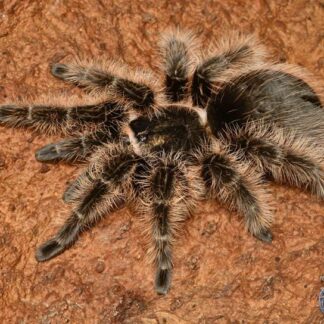Description
The Psalmopoeus reduncus, commonly known as the Costa Rican Orangemouth, is an arboreal tarantula native to Costa Rica. As a tropical country, Costa Rica experiences year-round warm temperatures and distinct wet and dry seasons. To properly care for this species, it is important to maintain a temperature range of 76°-82°F (24.4°-27.8°C) with a humidity level between 65%-75%. The substrate should be kept slightly dry and watered monthly. As an arboreal species, the Costa Rican Orangemouth requires a vertical enclosure with a hollow branch or cork for climbing and hiding. Adding plants, live or artificial, to the terrarium can encourage the tarantula to venture out of its hide. The substrate should be about one inch (2.54cm) in vials and deli cups for spiderlings and two inches (5.06cm) in terrariums for sub-adult to adult spiders. This tarantula feeds on a variety of insects, including baby crickets, adult crickets, and B. dubia roaches. It has also been observed to eat house geckos in the wild. Water can be provided through a small bottle cap glued to a leaning bark, and misting can be done as well. The Costa Rican Orangemouth is a medium-growing tarantula that can reach a leg length of six inches (15.24cm), although it typically grows to around five inches (12.7cm). While not considered a defensive tarantula, it may bite if provoked and can be fast-moving if startled. It is a seclude species and may not be visible without proper hiding spaces.




